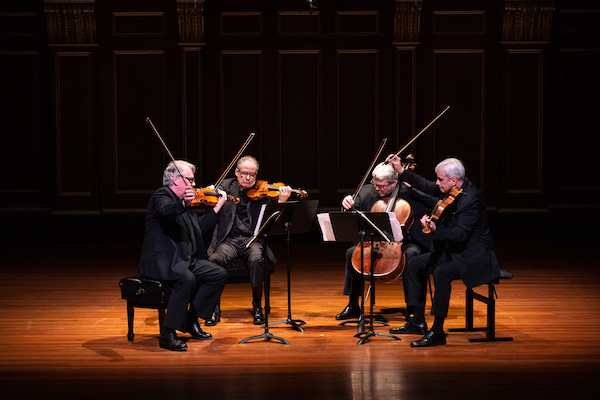Concert Review: Emerson String Quartet at Jordan Hall — Farewell to Boston
By Aaron Keebaugh
The Emerson Quartet’s greatest strength lies in its ability to temper individual excess in favor of a lush corporate blend.

The Emerson String Quartet at Jordan Hall. Photo: Robert Torres.
The ovation lasted several minutes. And they had yet to play a single note.
But there was a reason why anticipation was so high for the Emerson String Quartet’s recital last Sunday at Jordan Hall. After more than forty years together, the ensemble announced that they were retiring at the end of the current season. Sunday’s concert, presented by the Celebrity Series, was their final Boston performance, and it was a program that culminated in an affecting swan song.
The music was drawn from their most successful box sets, with two of the works in the lineup leaving listeners nostalgic. Bartok’s String Quartet No. 2 was the first score the young Emersons played together. And Beethoven’s String Quartet, Op. 59, No. 2, which concluded the afternoon, had served as their initial venture into the music of a composer that became their touchstone.
Such music has always revealed the depth and precision of this venerable band. Violinists Eugene Drucker and Philip Setzer complement each other with silvery tones that occasionally take on a robust edge. Violist Lawrence Dutton is consistently sensitive, while Paul Watkins anchors the ensemble with a cello sound that is felt as much as heard.
But the quartet’s greatest strength lies in its ability to temper individual excess in favor of a lush corporate blend. Every phrase unfolds as part of a lively conversation that seeks compromise, and the subtleties of this approach dominated on Sunday’s program.
The Bartók was a study in introspection. Composed in 1917, this ear-stinging score begins and ends in pensive stasis with a gritty scherzo thrown in for good measure.
The Emersons played with tasteful understatement in all the right places. Silken passages in the opening movement meandered appropriately, like slinky notes in search of a melody. In the third movement, dissonances rose to the fore before dissolving into phrases that yearned for resolution.
The central movement was all storm and stress. Playing with the verve of a village band, the quartet coaxed the varied tensions from the brash harmonies and scratching figures.
Shostakovich’s String Quartet No. 12, written in 1968, struck a similar balance between emotional distance and biting sarcasm. The Emersons treated the opening twelve-tone theme with unfamiliar warmth. But their tone soon cooled considerably, infusing a rough graininess that made the fleeting waltz and polka rhythms titter with wry humor.
The finale unfolded via colorful dimensions. Drucker and Setzer occasionally lightened up its grinding harmonies. Dutton and Watkins built the energy steadily, the final statements erupting with considerable force in the closing bars.
With an ensemble this superb, any weaknesses can reveal themselves unexpectedly. That was unfortunately the case with their Beethoven performance.
Though a staple of their repertoire, this quartet never quite jelled. The musicians capably conveyed the mystery and serenity that marks the first two movements. But intonation problems crept in during the Scherzo, robbing the music of its focus in critical moments. The finale fared better because of the quartet leaned into its wit and ebullience.
The afternoon’s greatest delight came with George Walker’s Lyric for Strings. Originally written as the slow movement to the composer’s String Quartet No. 1, this short work supplied over six minutes of lyrical bliss.
The Emersons never had the chance to play the full quartet for Walker, who died in 2018 at age 96. But their reading of this brief movement sang fervently — it was a belated and heartfelt homage.
It also added to the bittersweet resonances of the afternoon. Capped by an encore of Dvořák’s Cypresses No. 7, the Emersons bade memorable farewell to a city that had the good fortune to witness the transformations and triumphs of their storied career.
Aaron Keebaugh has been a classical music critic in Boston since 2012. His work has been featured in the Musical Times, Corymbus, Boston Classical Review, Early Music America, and BBC Radio 3. A musicologist, he teaches at North Shore Community College in both Danvers and Lynn.

Aaron makes many solid points here. The Walker was a joy to hear, as he notes. As for the Beethoven, I wasn’t bothered by the intonation issues, and one of the things I really liked was the way in which the Emersons approached and presented the music as groundbreaking – which of course it was. They gave it the same adventurous spirit they brought to the Bartok and Shostakovich. A great ensemble, and they will be much missed.